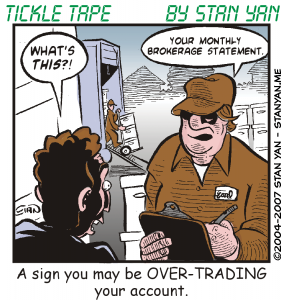Jack confides to his trading coach, “I think I’m paranoid. When I put on a trade, I feel as if the market is out to get me. It’s a problem. I’m always on edge. I feel as if I need to defend myself. And when the market goes against me, I get very angry. I want to get revenge.” Jack does indeed seem a little paranoid, but being paranoid when it comes to trading the market isn’t always a symptom of deeper psychological trouble. A little paranoia may even be healthy when trading the markets.
A common definition of psychopathology is a mismatch between a person’s character style and the context, or environment, in which he or she lives. For example, an extremely shy person is only viewed as having a psychological problem if he or she has a job that demands extraverted interactions with many people, such as a sales representative. If the shy individual never has to speak to another human being to survive, his or her shyness is not a problem.
When it comes to paranoia, extreme paranoia often poses a problem. For example, Dr Richard Geist, Innerworth advisory board member, argues in his book “Investor Therapy” that suspicious investors are out to expose a sham. They try to find a scandal that may impact the prices of a particular company’s stock, such as unethical accounting practices. Suspicious investors are very rigid. They usually have a preconceived notion that something is amiss and tend to only focus on evidence for their supposition that something is definitely wrong. Such a rigid focus can mean that evidence contrary to one’s position may be ignored, which often leads to biased judgment.
At an extreme, paranoia can pose a problem for traders. In Jack’s case, he is personifying the market. Although the market is composed of people who are all trying to make a profit, even at the expense of other market participants, it isn’t useful to look at trading this way.
Fellow market participants aren’t usually against a particular trader (unless it is a rare event where a thinly traded stock is “manipulated” by a few key players). Believing that your fellow traders are out to get you personally is just going to make you anxious and upset. It is more useful to view the market as an abstract entity, such as gravity or the wind. It is something to navigate around, rather than treat as a person who is out to get you and deserving of blame.
That said, there are times when a moderate amount of paranoia is realistic. Seasoned traders warn to be wary of anything you hear. Trading is replete with get-rich-quick schemes and methods that may work today but fail next month. The astute trader sifts through all possibilities and uses the information and methods that work best for him or her. It is useful to be suspicious rather than naïve. The gullible trader will learn quickly that overconfidence will lead to huge losses in the long run. Healthy scepticism is warranted when trading the markets.
In the end, a paranoid trader is likely to feel unnecessarily upset. It is vital to trade with a carefree mindset. “Don’t take is personally,” is the credo that all traders should follow. Objectify the market. Don’t personify it. You’ll be less prone to paranoia, and you’ll trade more effortlessly, consistently, and profitably.


